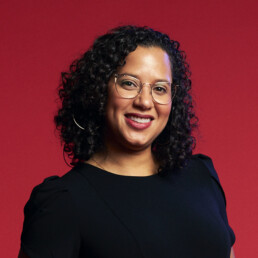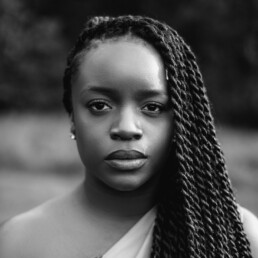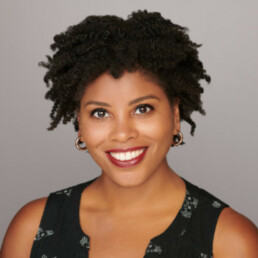WATCH OUR RECENT BRIEFING
January 2023 marked six months since the Supreme Court of the United States overturned Roe v. Wade, and we continue to live through a once-in-a-generation moment around reproductive freedom. At The Meteor’s recent briefing, Roe at 50: Abortion Access From Now On, leading experts shared their perspectives on the latest developments in the reproductive justice movement, and mapped out what comes next in the fight for our freedom.
We heard from:
- Renee Bracey Sherman, founder & executive director of We Testify.
- Brittany Packnett Cunningham, activist and the host of The Meteor’s feminist news podcast, UNDISTRACTED.
- Moderator Regina Mahone, senior editor at The Nation.
You can watch the briefing here—and sign up for our newsletter to stay in the loop about upcoming events.
HIGHLIGHTS
On the racist roots of the anti-abortion movement:
Whoever gets to control our reproduction, our freedom, our lives—that’s who’s in charge. And structures of white supremacy have always had an interest in controlling the fertility and populations of Black and brown people.
–Renee Bracey Sherman
On abortion and faith:
I want us to have the difficult conversations with other believers. Because there are plenty of faiths and religions that do not ban abortion. And the idea that a single version of Christianity—a white evangelical version—gets to tell the rest of us what we can and cannot do with our bodies is not only offensive, it’s actually not godly.
-Brittany Packnett Cunningham
On abortion as a pathway to parenting:
My abortion helped me to understand that I did want to become a mom, but only when I was ready for such a huge responsibility. Becoming a mom has reinforced for me why it is so important that people have the ability to make the decision for themselves and have access to whatever resources they need.
–Regina Mahone
On abortion storytelling:
Think about really listening when people tell you their abortion stories. The best gift that you can give to someone in your life who is ready to share their abortion story with you is your undivided attention and listening ear. Start that conversation, and that will give them more confidence to share their stories and ultimately change the conversation.
-Renee Bracey Sherman
RESOURCES
At our briefing, experts shared how to find information on where to get abortions right now, as well as additional resources on the most valuable things that individuals can do to support the reproductive justice movement.
- For information on how to get an abortion, visit ineedana.com. To get help to pay for an abortion, abortion funds are a critical resource. Find your local abortion fund at abortionfunds.org/need-abortion/.
- Curious about self-managed abortion? You can find out more at Plan C, which provides up-to-date information on how people in the U.S. are accessing at-home abortion pills online. And if you need help self-managing a miscarriage or abortion, visit the M+A Hotline for free support from a team of pro-abortion clinicians.
- Looking to figure out any abortion restrictions in your state and around the country? Visit this dashboard from The 19th* that tracks abortion rights in every state in this moment.
- We Testify’s Abortion Explained resource details everything you need to know about abortions, from the origins of the reproductive justice framework to the racist history behind the Hyde amendment.
Don’t miss the takeaways from earlier workshops: Roe on the Line: An Abortion Access Briefing; One Year Till the Midterms: A Voting Rights Briefing; After Texas: The Fight for Abortion Access; Justice for Mothers This Year: The “Momnibus” and More Ways to Make Change Happen; and Reproductive Rights and Justice: What’s Ahead in 2021.
ROE AT 50
“Confusion, violence, and frustration was the point.”
A conversation on criminalization and the racist roots of the anti-abortion movement.
On Wednesday evening, The Meteor Fund hosted a conversation with Renee Bracey Sherman, Brittany Packnett Cunningham, and Regina Mahone about the state of abortion access in the U.S. during what should have been the 50th anniversary of Roe v. Wade. Unfortunately, instead of celebrating a landmark victory, we’re all sorting through a new slate of laws, restrictions, and facility closures to try and understand where, how, and if we can receive reproductive care. As Renee Bracey Sherman explained, “States really worked hard to pass restrictions that exploited [the] daily challenges of moving about the country and affording health care…and then started criminalizing people because they were trying to get the care they need. And of course, we’re still seeing people who are being criminalized for the outcomes of their pregnancies, on top of people who are just confused as to ‘Can I get an abortion or not? And where do I go?’ Because the confusion, the violence, the frustration—all of that was the point beyond just making it illegal.”
Here are some of the gems our panelists dropped throughout the evening.
The racist roots of the anti-abortion movement
Renee Bracey Sherman
Whoever gets to control our reproduction, our freedom, our lives—that’s who’s in charge. And structures of white supremacy have always had an interest in controlling the fertility and populations of Black and brown people.
[Going back to the 1800’s around the end of slavery] white doctors targeted Black, Indigenous, and Eastern European immigrant midwives to kick them out of the birthing and labor space and to bring people into the hospital. So they had to have labor and delivery there, and through that, they demonized one of the procedures that midwives did—and that was abortion.
Part of it was also they were concerned about the population of white people. They wanted to make sure that the white population still outnumbered the increase of immigrants, Black people, newly free Black people, and then Indigenous folks. And so one of the many ways… I mean, they did it through a lot of really violent ways, but one of them was to be able to control who has babies and who doesn’t. And so by forcing white women to continue to have children…they were trying to ensure they could maintain control of the population.
Abortion as a pathway to parenting
Regina Mahone
My abortion helped me to understand that I did want to become a mom, but only when I was ready for such a huge responsibility and becoming a mom has reinforced for me why it is so important that people have the ability to make the decision for themselves and have access to whatever resources they need.
After my son was born, he required a NICU stay. Since his birth, he’s required frequent care and resources to aid in his development. He is amazing and resilient, but our society does not make it easy for parents. Health care and hospital care are not only expensive, but we parents have to navigate, taking time off from work, having reliable transportation, and possibly even child care for other children.
For some families, that means unpaid time off, or it means leaving your job, because the amount you’re bringing in doesn’t cover the cost of child care, or allow you to bring your child to different appointments throughout the week.
Parents, do you find a way to make it work while caring for our babies? Of course. But we shouldn’t have to. It shouldn’t be this hard and it’s often coming at our own expense. There are things like universal health care, social housing, and other programs all across the world, and it shouldn’t be this way [in the U.S.]
Abortion and faith
Brittney Packnett Cunningham
I want us to have the difficult conversations with other believers. Here’s why, because number one, there are plenty of faiths and religions that do not ban abortion. And the idea that a single version of Christianity—a white evangelical version—gets to tell the rest of us what we can and cannot do with our bodies is not only offensive, it’s actually not godly.
And I want us to be willing to say that to the people that we worship next to. I want us to ask them, where’s the religious freedom for our Jewish siblings? For our Muslim siblings? For people who do not practice religion?
Where is all of that stuff that we said is true about the country that we love, because it’s not religious freedom if it only applies to white Evangelicals. I want us to be willing to recognize that it is perfectly okay to be a person of faith that believes in, supports, and is pro-abortion and abortion access. I think that we need to be willing to say that out loud, and shout it from the rooftops, and actually be the kind of co-conspirators that this movement needs.
Police intimidation
Renee Bracey Sherman
I think there were a lot of folks who were thinking that police were going to save us outside of abortion clinics from protesters, and let me be real clear they are not.
In New York City right now (where four clinics are giving out free abortion pills) the mayor is allowing police to stand outside of Planned Parenthood locations where there are [anti-choice] people violently protesting and the police are protecting the protestors.
They have their backs to the anti-abortion protesters and are looking at the folks going into the clinic. So tell me how people are supposed to feel safe going to get these free abortion pills?
Police and abortion do not and will never mix.


